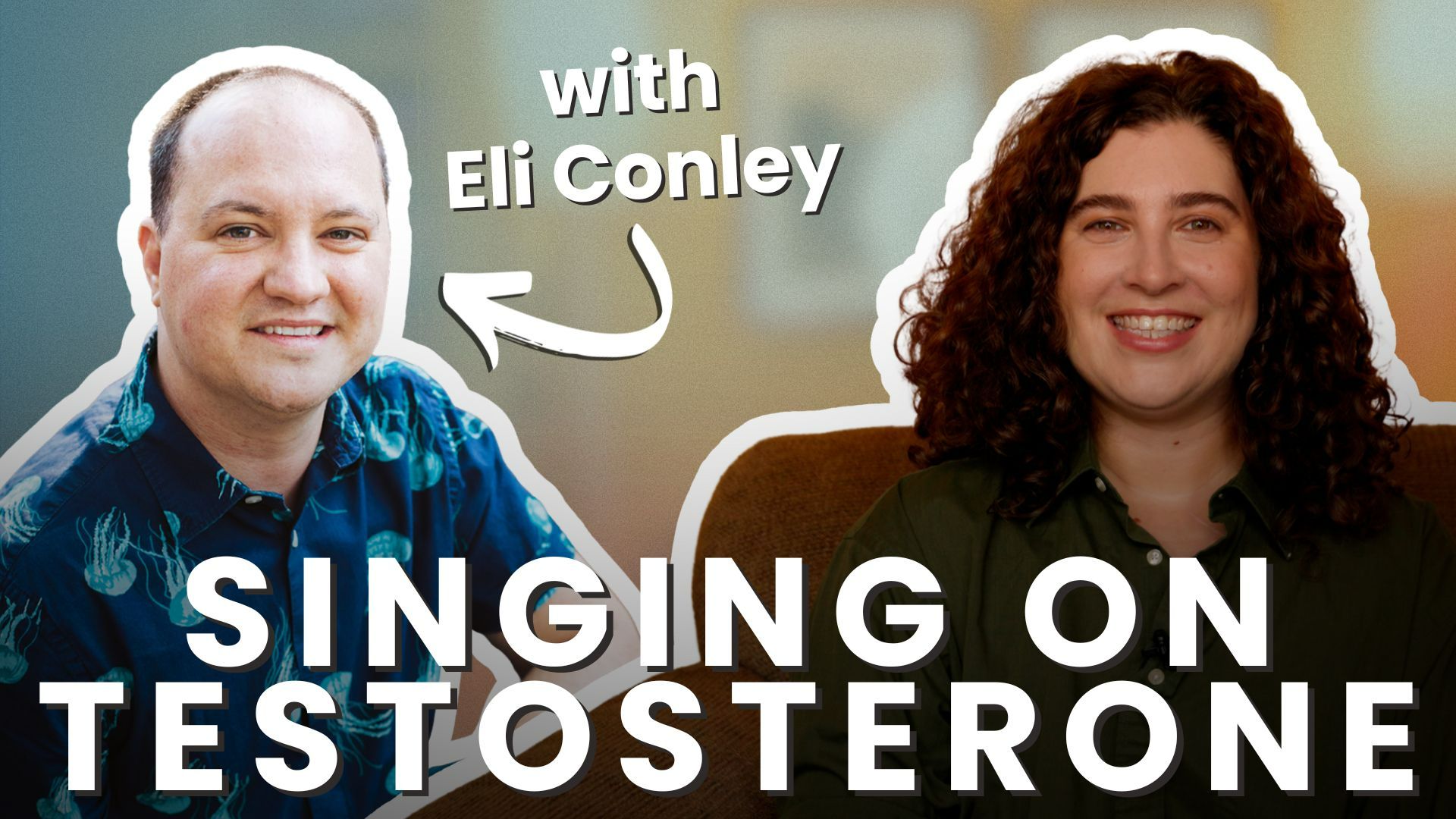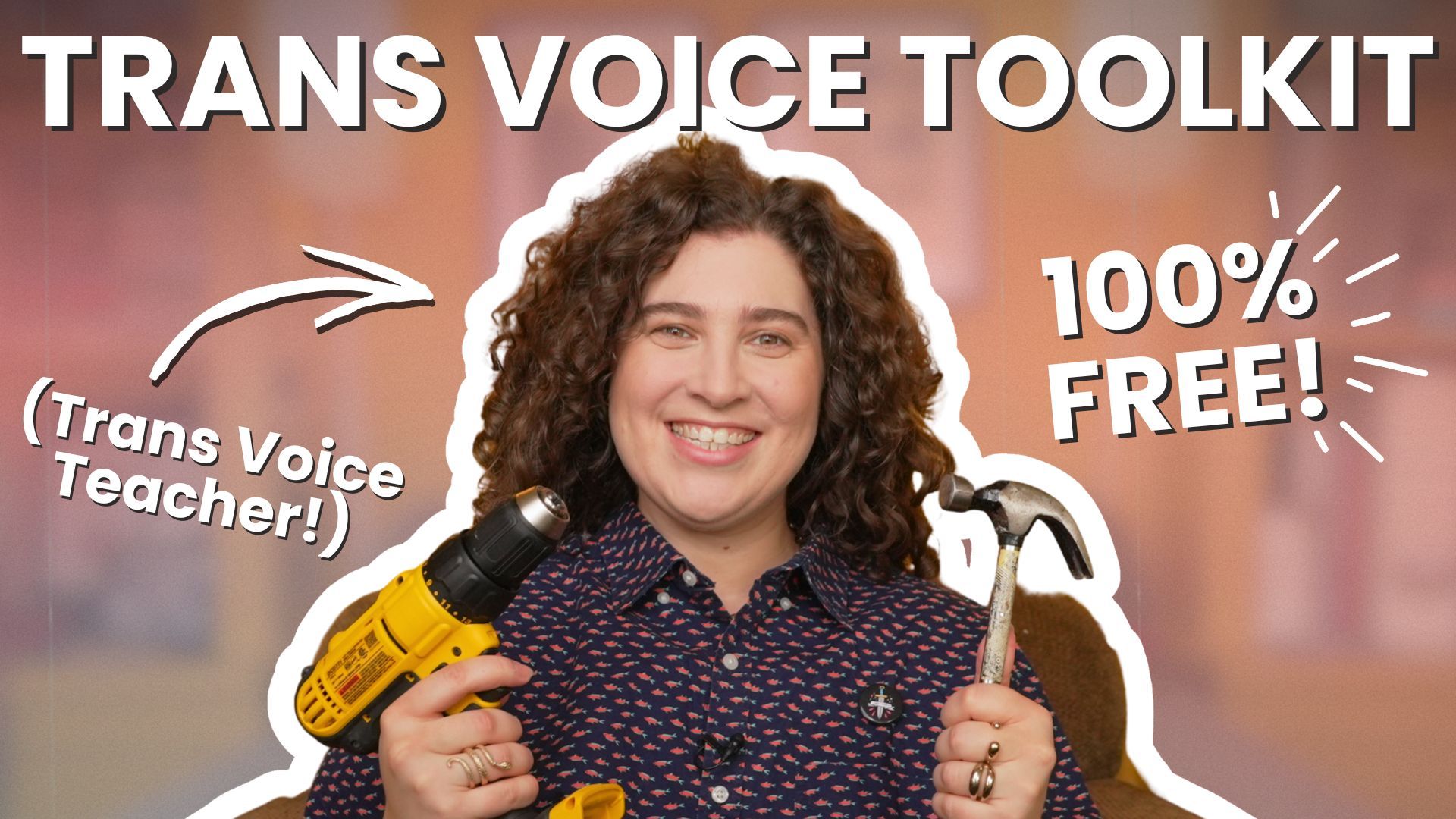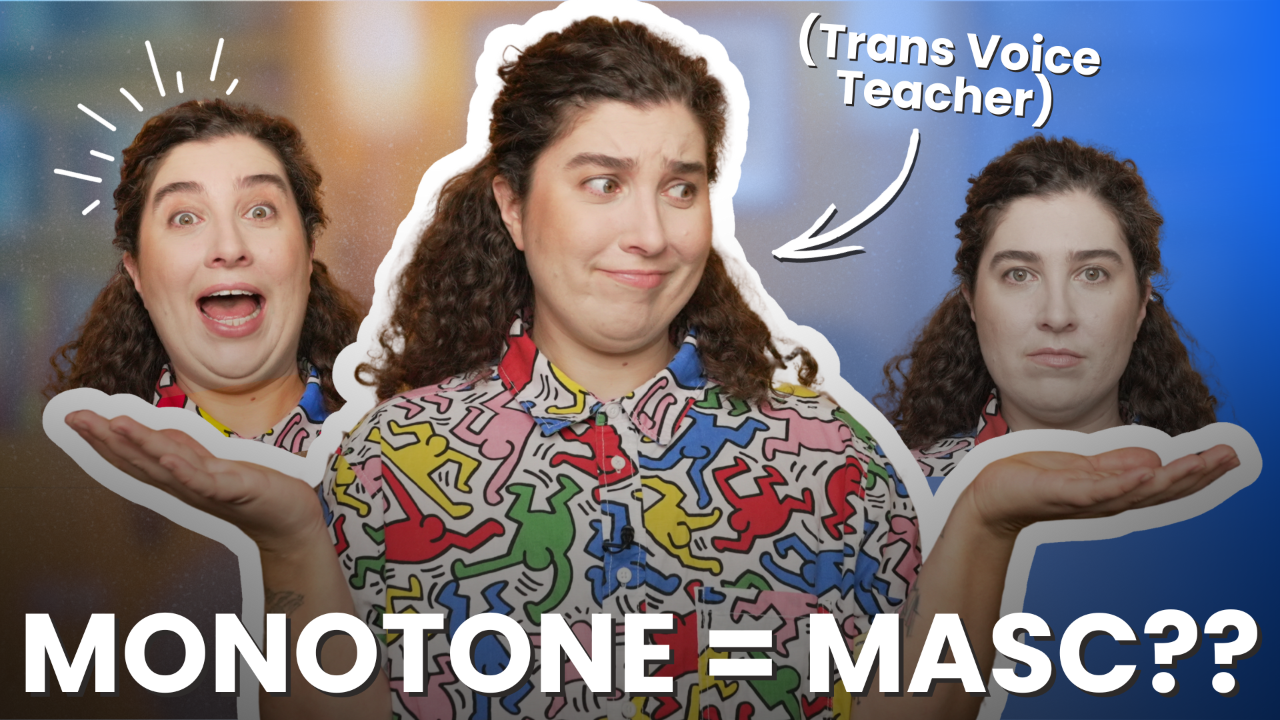Voice Training for Transmascs: Before, During, or After T
May 15, 2025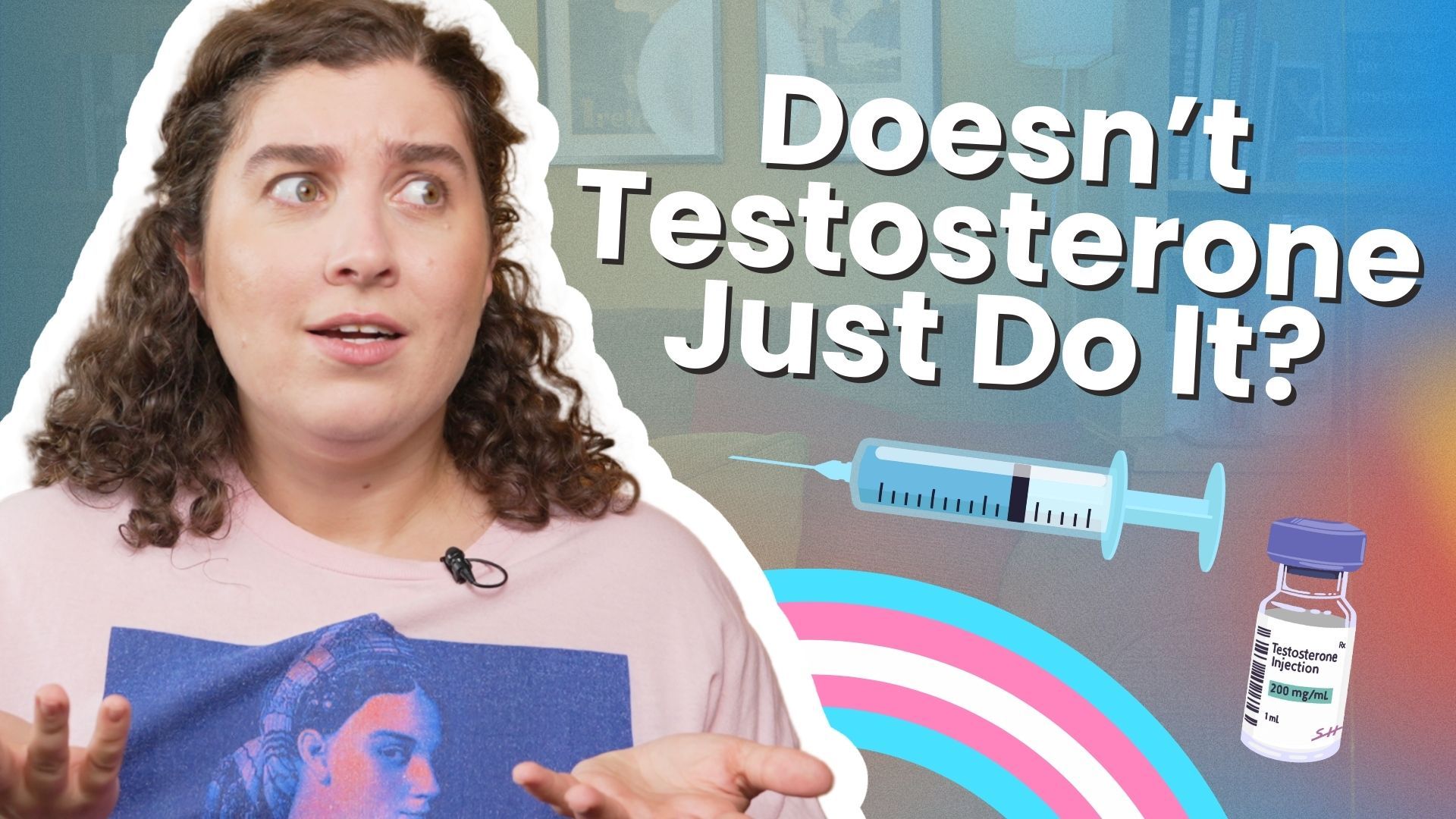
There's a common assumption in the transgender community: testosterone does all the work when it comes to masculinizing your voice, so trans men and transmasculine people don't need voice training.
But that's only part of the story.
As a gender-affirming voice teacher who's worked with hundreds of trans masculine clients, I've seen firsthand how voice training transforms outcomes for people at every stage of their testosterone journey—whether you're pre-T, currently on T, or years into your transition.
The truth is that while testosterone causes significant physiological changes to your vocal folds and vocal tract, it doesn't automatically teach you how to use your changed voice effectively. Many trans men find themselves with a different voice but still getting misgendered, or struggling with vocal fatigue, strain, or a voice that simply doesn't feel like home yet.
That's where masculine voice training comes in.
Watch the Full Video
Prefer to read? Keep scrolling for a complete breakdown of voice training for trans men and transmasculine people at every stage of transition.
What Testosterone Actually Does to Your Voice
Let's start with the science so you know exactly what's happening physiologically when you begin testosterone.
The Physical Changes
When you start taking testosterone, the most noticeable change is usually pitch. This happens because testosterone causes your vocal folds to thicken and grow longer. This thickening lowers the fundamental frequency—the acoustic measure of pitch—and for many people, this results in a voice that sounds significantly lower.
But it's not just about the vocal folds themselves. Testosterone can also lengthen your vocal tract—the space in your throat and mouth that shapes the sound of your voice. This extra space affects your resonance, which is what gives your voice that deeper, darker tone people often associate with masculinity.
Some folks also notice bony changes over time. Your jaw might widen, your face might change shape, and in some cases a visible laryngeal prominence (Adam's apple) can appear. These changes aren't just cosmetic, they actually affect how your voice sounds and resonates.
The Unstable Phase
Importantly: voice change on testosterone is a process, not a switch.
In the early months, your voice is often unstable. You might:
- Lose access to your high notes
- Experience cracking or voice breaks
- Feel vocal fatigue more easily
- Sound hoarse or strained
- Feel like your voice is clumsy or hard to control
There can also be inflammation or swelling during the voice change process, especially in the earlier stages, which can make it difficult to phonate. You may even sound like you're constantly recovering from a cold.
Even once these changes are complete (which can take anywhere from 2 to 5 years), you might still be adjusting to how it feels to use that voice. Because while testosterone changes the instrument, it doesn't teach you how to play it.
Why Voice Training Helps Even After Testosterone
So you've got this new instrument. Your pitch has dropped, maybe your resonance has darkened, and your voice sounds different. But it might not feel natural yet, or stable, or expressive in the ways you want it to be.
That's incredibly common.
A lot of trans masculine people reach this point and wonder: Why does my voice still feel off? They notice it tires out quickly, they can't project properly, it still doesn't feel like them, or they're getting misgendered even after months or years on T.
What Voice Training Actually Addresses
That's because physiological voice change doesn't automatically come with coordination, confidence, or comfort. Trans masculine voice training helps you learn how to use your changed voice in ways that feel intentional, embodied, and expressive.
Specifically, FTM voice training can help with:
- Improving resonance so your voice feels bigger, fuller, or more grounded
- Developing clarity and projection so your voice carries without strain
- Building endurance, especially if your voice gets tired or hoarse easily
- Retraining speaking patterns if old habits are pulling your voice too high or making it feel tense
- Reconnecting emotionally to your voice as part of your gender expression
For many people, voice is a significant source of gender dysphoria—or gender euphoria. When your voice isn't matching how you feel inside, it can be really hard to feel confident or safe in the world.
Training gives you tools, options, and agency. Whether you're years into transition or just starting out, you can develop a voice that feels like yours.
The Timeline: What to Expect with Voice Changes on T
Understanding the timeline can help you know when voice training will be most beneficial and what to expect at each stage. Singing teacher Peter Fullerton has documented five stages of voice change on testosterone, which provides a helpful framework for understanding the transition process.
First 3-6 Months
This is when you'll likely notice the most dramatic changes happening quickly. Your voice may crack frequently, feel unstable, or sound hoarse. This is completely normal—your vocal folds are actively changing.
Voice training during this phase focuses on:
- Vocal health and avoiding strain
- Managing the instability
- Building awareness of your changing instrument
6 Months to 2 Years
Your voice continues to deepen and stabilize, though changes may be less dramatic than the initial months. You're learning to navigate your new vocal range and capabilities.
This is an excellent time to work on:
- Resonance training
- Projection and clarity
- Developing your authentic speaking patterns
2-5 Years and Beyond
Most people consider their voice changes "complete" somewhere in this range, though subtle shifts can continue. At this stage, voice training helps you refine and master your masculine voice so it feels effortless and fully integrated into your identity.
What If You're Not On Testosterone?
Now you might be thinking: okay, but what if I'm not on testosterone? Maybe you're pre-T and exploring your options, or maybe you've decided that medical transition isn't for you.
The good news is transgender vocal training works even without hormones.
Your voice is a set of muscles and behaviours, and you can train it just like you can train your posture, your breathing, or your singing. You don't need testosterone to sound more masculine—you just need tools, guidance, and practice.
The Benefits of Starting Before T
In fact, starting voice work before beginning testosterone can actually make the transition easier. You'll already have:
- Awareness of how your voice works
- Skills for managing vocal strain
- Habits that support your goals
So when your voice does start to shift on T, you'll be better prepared to meet it with confidence instead of confusion.
That's exactly why I created Masculinize Your Voice Without Testosterone. It's a course designed for trans masculine people who want to explore vocal change without hormones, or who are preparing for testosterone and want to build a strong foundation first.
Whether you're pre-T, T-curious, or you know T isn't the right path for you, this course walks you through the same techniques I use with private clients: resonance, pitch, and inflection, all in a self-paced, accessible format.
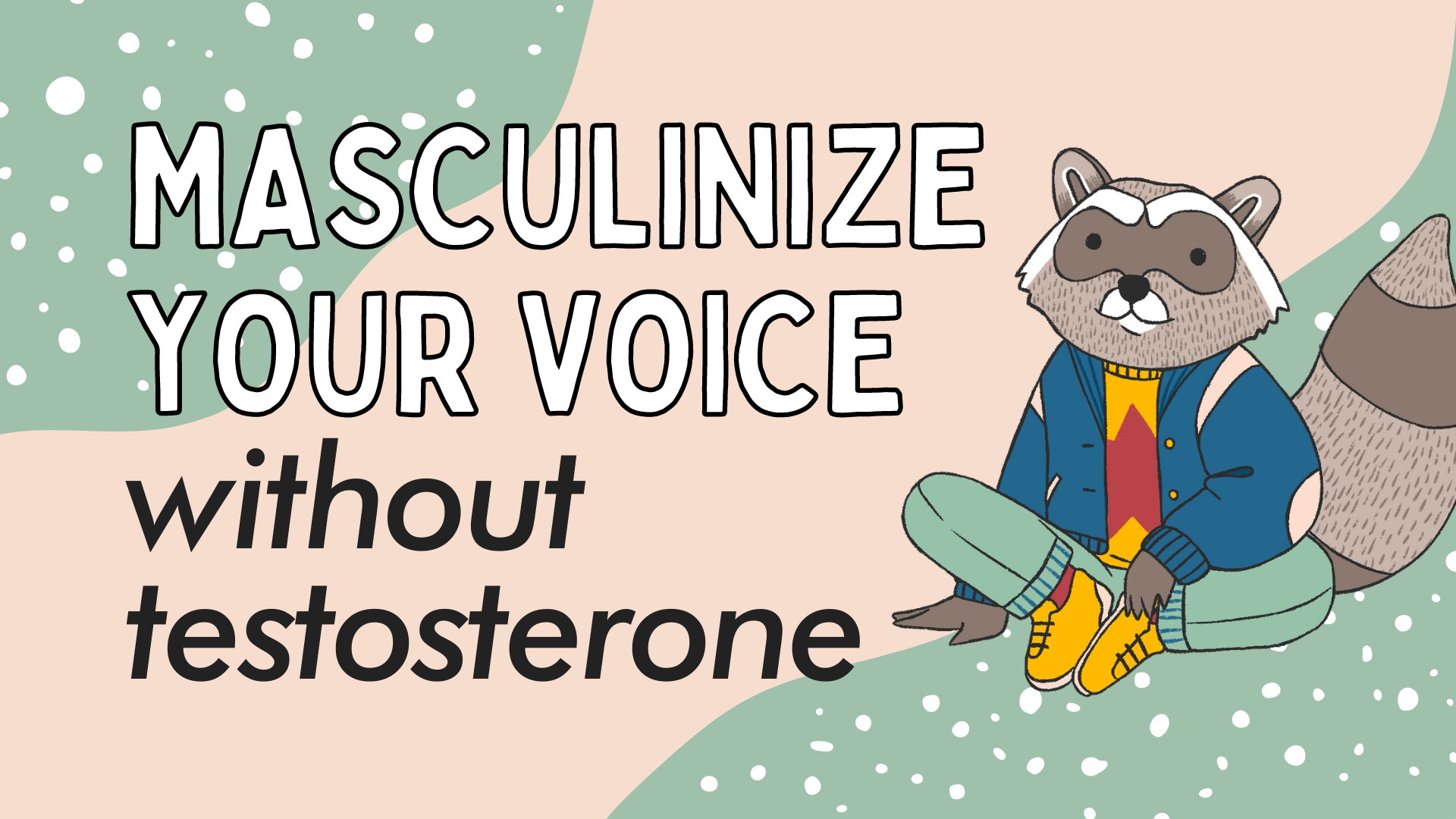
Masculinize Your Voice Without Testosterone
Getting Started with Transmasculine Voice Training
If you're ready to begin working on your voice, here are some foundational exercises you can try right now.
Big Dog, Little Dog
This classic exercise helps you explore the extremes of your resonance—the quality that makes your voice sound more masculine or feminine, regardless of pitch.
How to do it:
- Imagine you're imitating a big dog. Pant with as much depth and darkness as possible.
- Now imagine a tiny, high-pitched little dog. Pant with a bright, light quality.
- Go back and forth between these two extremes, noticing how different they feel in your body.
This exercise builds awareness of your resonance range and helps you find where your comfortable masculine voice lives.
Check out these related blog posts below for more about this exercise!
Key-Oh Exercise
This exercise helps you develop darker, fuller resonance in your speaking voice.
How to do it:
- Take a comfortable breath.
- Say "key" with a bright, forward sound.
- Then say "oh" with as much depth and darkness as you can manage.
- To create a darker sound overall, say "key" with the same shape as "oh"
- Maintain that shape and say a short word or phrase.
This helps you develop control over your resonance so you can intentionally create a more masculine sound quality.
Check out these related videos for more on this exercise!
Learning from Others
One of the best ways to understand transmasculine voice is to hear from people who've been through the process. I highly recommend checking out my interview with Eli Conley, an incredible voice teacher and singer who specializes in working with trans masculine folks navigating voice changes on testosterone.
Eli has also created a YouTube playlist featuring singers on testosterone, which is an amazing resource to hear the diversity of trans masculine voices and singing styles.
I also recommend the work of Peter Fullerton, another amazing teacher who specializes in singing on testosterone and has extensive resources for folks on T. Peter and Eli frequently collaborate on workshops and info sessions about singing through testosterone transition. Peter has also created a helpful slideshow on the five stages of voice change on testosterone, which provides a clear visual guide to what you can expect during your transition.
Key Takeaways: Trans Masculine Voice Training and Testosterone
1. Testosterone Changes Your Instrument, But Doesn't Teach You to Play It
Physiological changes from T are significant, but they don't automatically give you coordination, confidence, or the speaking patterns that will help your voice feel authentically masculine.
2. Voice Training Works at Every Stage
Whether you're pre-T, currently experiencing voice changes, or years post-transition, voice training can help you develop a voice that feels like home.
3. You Don't Need Hormones to Masculinize Your Voice
Trans masculine voice training is effective even without testosterone. Your voice is trainable, and you have agency over how you sound regardless of your medical transition status.
4. The Process Takes Time
Voice changes on testosterone can take 2-5 years to complete, and adjusting to your new voice is an ongoing process. Be patient with yourself and your voice as you navigate these changes.
5. You Don't Have to Figure It Out Alone
Whether through courses, private coaching, or community resources, support is available for your trans masculine voice journey.
Resources for Trans Masculine Voice Work
Ready to dive deeper into masculine voice training? Here are some resources to support your journey:
For Those Not On T or Pre-T
Masculinize Your Voice Without Testosterone is my comprehensive course for trans masculine people who want to develop a masculine voice without hormones, or who want to build foundational skills before starting T.
Free Resources
Check out my freebies library for voice training tools, including exercises and guides for masculine voice development.

Masculinize Your Voice Without Testosterone
Conclusion: Your Voice Deserves Care and Attention
Whether you're not on T, just starting out, or years into transition, your voice deserves care, attention, and love.
You don't have to settle for a voice that feels off, and you don't have to figure it out alone. Voice training for trans men and transmasculine people is about more than just lowering your pitch. It's about developing a voice that feels embodied, expressive, and authentically yours.
The physiological changes from testosterone are just the beginning. What you do with those changes, how you learn to use your new instrument, and how you develop your unique vocal identity and that's where the real transformation happens.
And that transformation is absolutely within your reach.
Ready to explore your masculine voice?
Whether you're preparing for testosterone or building a masculine voice without hormones, Masculinize Your Voice Without Testosterone gives you the tools and techniques to develop a voice that feels like home. Work with a transgender voice coach who understands your journey.
Want weekly tips, resources, and insights on trans voice training? Sign up for my newsletter and get the latest content delivered straight to your inbox. It's free!







